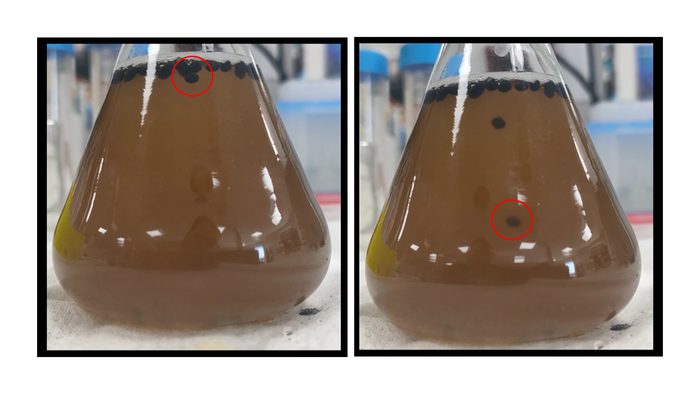Craft brewers are continuously upping the ante and coming up with innovative ways to make or flavor their newest beers. Now, researchers are adding a new twist of their own, speeding up the brewing process with beer-making mini-robots or “BeerBots.” Reporting in ACS Nano, the team shows that these self-propelled, magnetic packages of yeast can make the fermentation phase go faster and cut out the need to filter the beverage.

Credit: Adapted from ACS Nano 2023, DOI: 10.1021/acsnano.2c12677
Craft brewers are continuously upping the ante and coming up with innovative ways to make or flavor their newest beers. Now, researchers are adding a new twist of their own, speeding up the brewing process with beer-making mini-robots or “BeerBots.” Reporting in ACS Nano, the team shows that these self-propelled, magnetic packages of yeast can make the fermentation phase go faster and cut out the need to filter the beverage.
Beer, one of the world’s most-consumed drinks, can take a while to brew. In the first step, sugars are extracted from grains, such as malted barley, to create a watery solution called wort. Next, yeasts ferment those sugars, converting them into alcohol, carbon dioxide gas and new flavor compounds. This step can take as long as four weeks, and during that time, unwanted microorganisms can get in and spoil the final product with sour flavors. Previous researchers have suggested that encapsulating the yeast in polymer capsules could lessen the chance of spoilage by speeding up the process. So, Martin Pumera and colleagues wanted to develop a self-propelled bot to both make fermentation proceed more quickly and simplify the separation of yeast from the final beer.
The researchers made 2-mm-wide BeerBot capsules by combining active yeast, magnetic iron oxide nanoparticles and sodium alginate from algae and dripping the mixture into a ferric chloride solution. Then they made one side of the spheres porous by exposing that half to an alkaline solution in an electrochemical cell.
Initial experiments showed that the yeast-containing beads could ferment sugar and produce carbon dioxide bubbles that propelled them upward. When they got to the surface, they released carbon dioxide into the air, and then sank again, resulting in a bobbing motion. When used to ferment malted barley wort, the team found that the self-propelled BeerBots transformed sugars faster than free yeast cells. As the sugar was used up and fermentation ceased, the yeast-containing capsules sank to the bottom of the flask. This made it easy to separate the yeast from the final product with a magnet, rather than with a filtration step that’s currently required to remove free yeast cells. Additionally, the collected BeerBots were active for up to three more wort fermentation cycles. Based on these results, the researchers say that BeerBots could produce tasty brews faster.
The authors acknowledge funding from the Grant Agency of the Czech Republic.
The American Chemical Society (ACS) is a nonprofit organization chartered by the U.S. Congress. ACS’ mission is to advance the broader chemistry enterprise and its practitioners for the benefit of Earth and all its people. The Society is a global leader in promoting excellence in science education and providing access to chemistry-related information and research through its multiple research solutions, peer-reviewed journals, scientific conferences, eBooks and weekly news periodical Chemical & Engineering News. ACS journals are among the most cited, most trusted and most read within the scientific literature; however, ACS itself does not conduct chemical research. As a leader in scientific information solutions, its CAS division partners with global innovators to accelerate breakthroughs by curating, connecting and analyzing the world’s scientific knowledge. ACS’ main offices are in Washington, D.C., and Columbus, Ohio.
To automatically receive news releases from the American Chemical Society, contact [email protected].
Follow us: Twitter | Facebook | LinkedIn | Instagram
Journal
ACS Nano
DOI
10.1021/acsnano.2c12677
Article Title
Nanostructured Hybrid BioBots for Beer Brewing
Article Publication Date
12-Apr-2023




